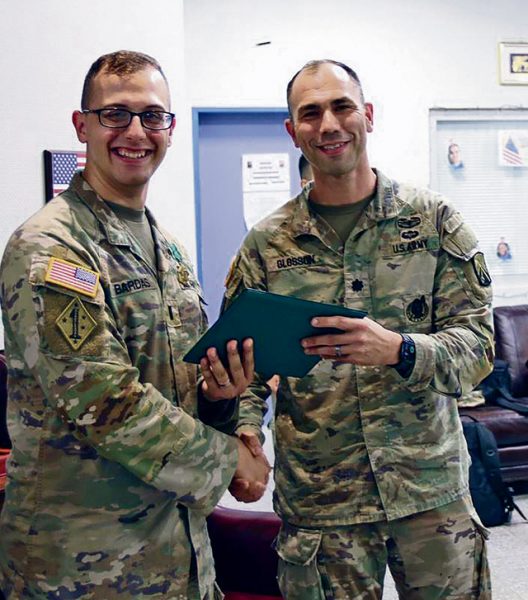
Alone, so deep in the woods that no one could hear his cries for help, young Michael Bardas, a self-proclaimed “adrenaline-junky” edged to the cliff face.
His pulse raced, and his breathing quickened. He sprang forward and sped toward the murky, churning water below. Luckily for Bardas, he survived to tell the tale and grew up to be a commissioned officer in the U.S. Army.
These days, 1st Lt. Michael Bardas, the safety officer in charge of the 16th Special Troops Battalion has safety in the front of his mind all day every day. Recently, his dedication to the 16th STB safety program resulted in him being awarded the U.S. Army Europe and Africa Command’s Individual Award of Excellence in Safety for junior officers.
“When I was younger, I was a foolish live-free, die-hard teenager and just didn’t think about the safety aspect of some of the things I did,” said Bardas. “I did all sorts of stupid things that could have gotten me hurt from cliff jumping to off-roading full speed in the National Forest. To make things worse, I was known for disappearing into the wilderness alone and not letting anyone know where I was going. As I got more experience in life, I learned the importance of safety and how having a safe workplace can make a huge difference in Soldier and employee morale and mission readiness,” Bardas explained.
In May 2023, Bardas was given the reigns for the battalion’s safety program. His battalion commander, Lt. Col. Hardy Johnson, sat him down and explained that safety was a primary battalion goal. Soon after Bardas assumed the position, Johnson empowered him with a message to the battalion staff. “He told everyone that safety was a priority and that when I have safety input, I am speaking on his behalf. Because the commander had my back, it made a huge difference in my ability to keep Soldiers safe,” said Bardas. “My commander now, Lt. Col. Glosson, continues to support my efforts.”
Bardas credits his passion for safety to multiple factors. “I look back at my childhood and I am grateful nothing unfortunate happened. I also thank and love my wife for coming to me one day when I was shooting on our property in Colorado, and I hadn’t fully cleared an area for target practice. She reminded me and continues to remind me, I am a husband and a father, and my family needs me to stay safe. That day stands out as pivotal in the way I think about safety. So, she is the original source of my passion,” Bardas explained.
Bardas began his career as an enlisted Soldier having held multiple separate military occupation specialties in the engineer corps before leaving the Army to earn his degree and change his stripes for a gold lieutenant bar. During his time as a combat engineer and a horizontal construction engineer, Bardas witnessed incidents that likely could have been avoided. “I draw from the knowledge of my past enlisted days where I saw Soldiers get hurt. Now I am in a position to create and run a program that avoids the mistakes I have seen in the past,” Bardas said. “I want all of my Soldiers to make it home to their families at the end of the day,’ he explained,” he said.
Since his role began as the battalion safety officer, Bardas has implemented several new programs for the battalion, like an inspection calendar and the hearing conservation program. When Bardas took on his current role, the battalion did not have any certified fire safety personnel in the work and living spaces.
“I built our fire safety and prevention program. We have a partnership with the Baumholder Fire Department. They support us with training spaces throughout the year to give our personnel training. All of our barracks managers are trained personnel who know how to prevent fires and what to do in case of a fire,” said Bardas.
In many Army units, tragedy strikes without warning due to the untimely deaths of servicemembers who crash their motorcycles.
According to an Army safety report (curbing motorcycle fatalities in 2024) on safety.army.mil, FY23 was the worst year in a decade for fatal PMV-2 (motorcycle) mishaps. The Army saw 38 Soldiers die in motorcycle mishaps in FY23, which is well above the five-year average from FY18-22 of 24 fatalities a year.
“Motorcycle safety is a hot topic. I was talking to some of our riders in the battalion and they were explained that they had the advanced rider certifications. From there, we created a motorcycle mentorship program, which resulted in a local community partnership with the local Baumholder Motorcycle Club,” said Bardas. “We formed the partnership and ended up doing a familiarization ride between our battalion servicemembers and locals from the motorcycle club.”
Future plans for the motorcycle mentorship program are to merge with other battalions within the 21st Theater Sustainment Command and grow the program, according to Bardas.
“My goal is to continue to build on the successes and best practices we have implemented as a battalion. Honestly, I just legitimately care about people getting home safely. I wouldn’t want to have someone tell my family that dad’s not coming home,” Bardas said.
The 21st TSC places heavy emphasis on empowering leaders to make safety corrections and run thorough safety programs.
“We are all proud of the work that people like Lieutenant Bardas is doing. We have a strong cadre of professionals throughout the 21st TSC who care about unit and individual safety. This USAREUR-AF safety award is just one indicator of his passion and motivation,” said John Rice, the 21st TSC safety director.


